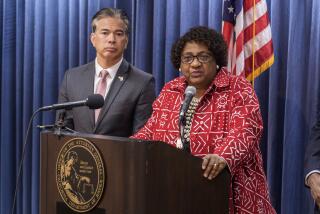A firewall for democracy
- Share via
BRUCE MCPHERSON, California’s secretary of state, has just performed an invaluable service for the voters. Only a few months into the job, he had been under intense pressure to certify the latest electronic touch-screen voting machine manufactured by Diebold Election Systems, which is supposed to help California counties meet a federally mandated January deadline for the overhaul of their election equipment. But instead of rolling over, his office conducted exhaustive tests on the Diebold TSx, discovered that it had a 10% error rate -- worse than the reviled punch-card machines used in Florida in 2000 -- and sent the company back to the drawing board.
This is hugely important for two reasons.
For the record:
12:00 a.m. Aug. 22, 2005 For The Record
Los Angeles Times Monday August 22, 2005 Home Edition California Part B Page 11 Editorial Pages Desk 2 inches; 69 words Type of Material: Correction
Voting machines: An Aug. 4 Op-Ed article about electronic voting said California election officials’ recent tests on Diebold touch-screen machines produced a 10% error rate, worse than the punch-card machines used in Florida’s November 2000 election. The error rate that the state found referred to the number of machines that had screen freezes or paper jams. Diebold says that no votes were miscast or ruled invalid in the process.
First, because companies such as Diebold have been operating far too long without adequate public oversight, while charging taxpayers tens of millions of dollars for equipment that some of the country’s best computer scientists have found is sloppily programmed, dangerously insecure and virtually unable to be audited for fraud or error.
The TSx, which is fitted with an independent paper trail to make recounts possible, was waved through the hazily regulated federal certification process and was deemed to have passed muster in Utah, Ohio and a handful of other states. None appear to have noticed the paper-jamming and screen-freeze problems picked up in the California tests.
McPherson’s decision is also significant because the same line of Diebold machines has now been refused certification by California secretaries of state from both major parties. McPherson is a Republican, and his predecessor, Kevin Shelley, who cracked down on Diebold last year after the company admitted shortcomings that included the use of uncertified software, is a Democrat. That shows the vulnerabilities of the electoral process are not, at heart, a question of partisan politics. Rather, this is about the integrity of this nation’s democratic infrastructure.
The county officials who have succumbed to the lure of paperless touch-screen machines need to be held accountable for their lavish spending on cutting-edge technology that, fears about hacking aside, clearly isn’t built very well.
Extraordinarily, many election officials still claim that the touch-screen machines sold by Diebold, Sequoia and their competitors are miracle machines guaranteeing flawless elections. Maryland’s Linda Lamone, president of the National Assn. of State Election Directors, told a public hearing in Pasadena last week that e-voting skeptics were scaremongers unduly influenced by “sensationalized newspaper articles.”
Never mind that those skeptics include computer scientists from Stanford, Johns Hopkins and Rice universities and the Lawrence Livermore National Laboratory. Never mind that several high-profile studies -- such as the Florida commission report on the 2000 election -- have concluded that optically scanned paper ballots, not touch-screens, are the safest and most reliable technology available.
The federal government also needs to be held accountable for leaving the technology of voting in a regulatory vacuum, and creating an oversight body -- the Election Assistance Commission -- so weak and underfunded that it is only now scrambling to draft standards for technology that has, for the most part, already been developed and sold.
Congress has no control over the machine-certification process, and the Federal Election Commission, which has drawn up technical specifications in the past, is so far behind the curve that most electronic machinery now in use meets standards drawn up as far back as 1990, the Stone Age of computing.
This lamentable state of affairs is not irreversible. Two years ago, when Shelley mandated an independent paper trail for all Californian voting systems -- an essential prerequisite for proper recounts -- it created a chain reaction causing 17 states to follow suit. McPherson’s rejection of Diebold’s substandard machine may well have a similar effect nationwide.
The voters certainly deserve better. If there is no accountability in the conduct of elections, then no other aspect of American democracy is completely safe either.
More to Read
Get the L.A. Times Politics newsletter
Deeply reported insights into legislation, politics and policy from Sacramento, Washington and beyond. In your inbox three times per week.
You may occasionally receive promotional content from the Los Angeles Times.










